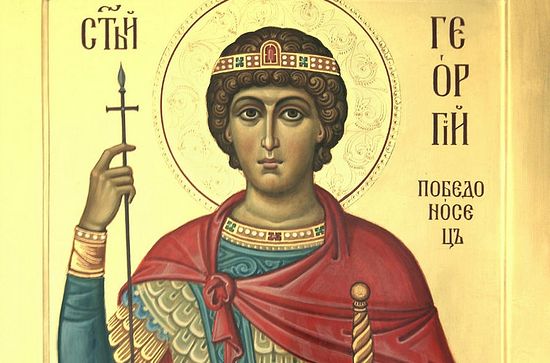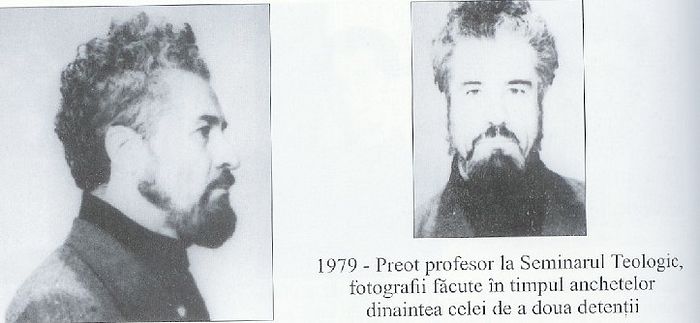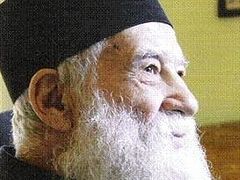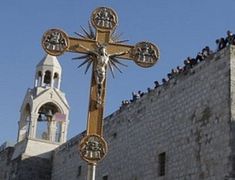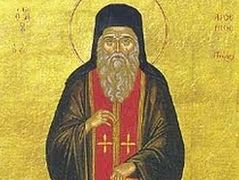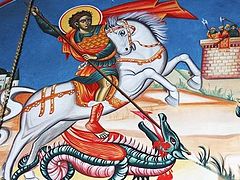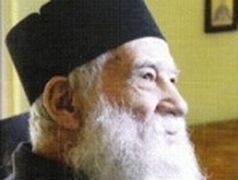The Church venerates as saints a number of warriors who served in the Roman army. Christianity was then very widespread, and when Christians were under the persecutions, they preferred eternal glory and the unfading crown of martyrdom over worldly military glory, publicly confessing their faith in Christ and not denying it though it cost them their lives.
Great Martyr George lived during the time of Emperor Diocletian, who ruled from 248-305. He was an emperor who was very inclined toward the pagan gods. For this reason he took a very antagonist position against Christians. His persecutions against Christians, which lasted all the way to the year 305, were possibly the cruelest and longest. Then he became mentally ill, and his own victims began to “persecute and chase” him. He was continually threatened with murder. Therefore he left his palace on the Dalmatian coast and lived in isolation, never receiving anyone except his guards; however he was afraid of them also and his life became quite torturous. It is supposed that he died in the year 313, and that is when the persecutions against Christians ended. He died all alone, after living in the horror of all his fears, which gave him no peace.
We have this information from Lactantius,[1] a very educated man who served as a tutor in Diocletian’s home.
In the beginning Diocletian did not repress Christians so fiercely—that is, not to death. Meanwhile, Lactantius became a Christian and lost his position, but he wrote a chronicle of the time of Diocletian; and in the book, On the death of persecutors, we can see that all those who persecuted the Church of Christ ended badly, the clearest example being Diocletian, whom he knew during the emperor’s best years as well as during his period of insanity.
Diocletian’s insanity was dark—he was a man terrorized by inner fears. It continually seemed to him that any minute the Christians would come, that Jesus would come and punish him for the murders he committed, and therefore he persecuted them even more fiercely.
As I said, at first the persecutions were not so harsh. The first form of persecution was the decree that all who serve in the army must sacrifice to the gods if they want to stay in the army, and if they don’t, they will be dismissed. This was his first persecution. Meanwhile he visited pagan oracles, who always gave him confused answers. These oracles told him that he has to persecute Christians. Then, in 303, he issued a very harsh decree stating that all the Holy Scriptures in the Christians’ possession must be handed over to the authorities and publicly burned on the town squares.
In this situation, his father-in-law, Galerius, set two fires in the emperor’s palace in Nicomedia where Diocletian was living at the time, and accused the Christians of the arson. Then Diocletian ordered that all the clergy (priests and deacons) be arrested, and he forced them to sacrifice to the gods. Thus were many Christians subjected to tortures, thrown to wild beasts to be eaten, and killed; and Christianity was given an extraordinarily large number of martyrs.
This persecution encompassed the entire empire. It reached as far as Romania, when the martyrs Zoticus, Atalus, Philippos, Kamasisos were killed in Niculiţel…[2] This was widespread persecution. Then Diocletian ordered that all soldiers, not only officers, who believed in Christ and confessed their faith must be punished.
In these conditions St. George decided to confess his faith in Christ. He came from a highly placed family, was therefore well educated, and his parents were Christians. He had a handsome appearance, was one of the bravest fighters, and because he was so gifted and distinguished in battle Diocletian very quickly promoted him and made him commander of the imperial guard. He was in this rank when Diocletian issued his decree, which applied to all Roman citizens, who were compelled to sacrifice to idols on the square once a month. Then it was discovered that there were many Christians, perhaps tens, even hundreds of thousands, and they were all going to have to suffer. Under these circumstances St. George resolved to confess his faith in God and Christ before the emperor and the senate.
When the emperor was sitting in the senate and making decisions, St. George entered and started talking about his faith in Christ as the King. He said that he prefers to serve Christ rather than the emperor of a pagan empire, and his service to Christ will consist not in wielding the sword and military victories, but in bringing himself as a sacrifice for Christ’s sake. He confessed before all that he was ready to receive a martyr’s death. This witness of St. George, who had earned the emperor’s love and the senate’s praise, provoked confusion and regret—but also displeasure.
The emperor ordered St. George arrested. They put him in prison and demanded that he deny his faith. But because he refused to do this, he was given over to all kinds of tortures and became possibly one of the most tormented martyrs: his feet were locked in red-hot iron sandals with nails, he was put on the wheel, thrown into the sea with a stone around his neck but as it says in his Akathist, he stood on the waves of the sea as on dry land, he was thrown into quicklime, but was not harmed in the least.
God gives His martyrs special spiritual strength, and I have seen this in prison. That is, completely weak people, sick people who are barely breathing—like Valerian Gafencu[3]—did not feel any suffering and continued to confess God, blessing their tormentors. Such was Gafencu, who died like a saint. So it was with all the martyrs. God gives them strength, and sometimes they do not even experience any physical suffering. Their flesh was torn with iron claws, nails were pounded into the hands and feet, they were burned with fire, and they felt no pain. God gave them this strength to pass through sufferings.
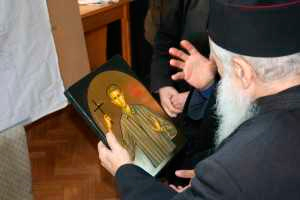 Fr. George Calciu holding an icon of Valerian Gafencu.
Fr. George Calciu holding an icon of Valerian Gafencu.
There was a close connection between St. George and me. When I was in prison I always called upon him, and he helped me in many circumstances. From that time on and to this day I never cease to pray to him every day. I am convinced that between a saint and those who pray to him a close connection is formed, and often many of the saint’s qualities, if you have a close spiritual connection with him, appear in you also.
In my case, for example, just as St. George went through prison, so did I; as St. George was strengthened by God in difficult circumstances, so was I strengthened in the most difficult moments, when I might have perished not only physically but also spiritually. But the saint’s presence strengthened me, because he gives to those who bear his name firmness in faith and spiritual protection, which God gives us through him.
Pray to the saint whose name you bear, and he [or she] will help you. Turn to him in times of sorrow and sickness; in difficult circumstances and in moments of joy: “St. John (or, St. George), my protector, pray to God for me, a sinner!” Pray to him and he will hear your prayer! He is your advocate before God, the advocate of all those who bear his name. He brings our prayer before God and intercedes for us.
At the end of life, when we depart for the other world, our patron saint will be standing next to us. If we venerated him and prayed to him, he will stand next to our guardian angel to protect us from satan’s accusations.
This is because at the personal judgment the devil pulls out all our sins, even those we don’t remember, exhibits them for everyone to see, and throws them on the scales. And we must have an advocate to defend us, who will make all our good deeds known. After all, we will be so humiliated that we may not even remember our good deeds, just as we forgot our sins. But our guardian angel and patron saint will come and place all our good deeds on the scales. And often one tear surpasses all the evil deeds we did throughout our whole lives.
Therefore I ask you to remember the saints whose names you bear, and pray that they would protect you, protect your families, your nation, and all people.[4]

